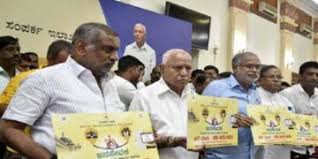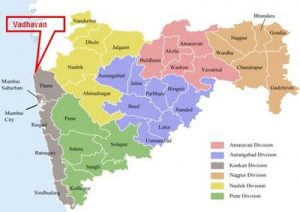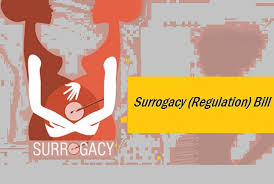Table of Contents
Daily Current Affairs for Government Exams:
Today Current Affairs: 6th February 2020 for UPSC IAS exams, State PSC exams, SSC CGL, State SSC, RRB, Railways, Banking Exam & IBPS, etc
Contents:
- Shri Ram Janmbhoomi Teerth Kshetra Trust.
- India International Seafood Show (IISS)
- Intellectual Property Index.
- Janasevaka scheme.
- Vadhavan port in Maharashtra.
- Vivad Se Vishwas Scheme.
- SC Panel Recommendations on Prison Reforms.
- Soil Health Card Scheme.
- Select Committee recommendations on Surrogacy (Regulation) Bill.
- Other important current affairs.
1. Shri Ram Janmbhoomi Teerth Kshetra Trust :

Centre Government has issued gazette notification over setting up of Shri Ram Janmbhoomi Teerth Kshetra Trust for the construction of Ram Temple in Uttar Pradesh’s Ayodhya.
- The trusts will have an office in Delhi’s Greater Kailash.
- Shri Ram Janmabhoomi Teerth Kshetra Trust will have 15 trustees, out of which one trustee will always be from the Dalit community.
- This trust will be completely free to take every decision related to the temple and 67 acres of land will be transferred to the trust.
- In the notification, Home Ministry also said, the Uttar Pradesh government had already issued the allotment letter of a five-acre plot to the Sunni Waqf Board for construction of a mosque, as directed by the Supreme Court.
2. India International Seafood Show (IISS) :

The 22nd edition of India International Seafood Show (IISS) will be organized from 7-9 February 2020 in Kochi.
- The India International Seafood Show (IISS) 2020 is being organized by the Marine Products Export Development Authority (MPEDA), under the Ministry of Commerce and Industry in association with the Seafood Exporters Association of India (SEAI).
- The theme of this year’s seafood show is “Blue Revolution- Beyond Production to Value Addition”.
- The 21st edition of IISS was held in Goa in January 2018.
During 2018-19 India has exported over 14,37,000 tons of marine products worth USD 6.70 billion as per provisional figures.
3. Intellectual Property Index:

The Global Innovation Policy Centre (GIPC) of the US Chamber of Commerce released the International IP (Intellectual Property) Index.
- According to the ranking, India was at position 40 of the 53 economies.
- The report released by GIPC says that India remains to be the most challenging but still promising market for IP-intensive industries.
- This year India scored 16.22 in Intellectual Property Index. India’s score has shown improvement by 7% as compared to the previous year reporting of GIPC.
- However, based on relative performance, India has pushed four ranks backward.
- In 2019, India was at 36th rank improving from 44th position in 2018. It was the highest gain for any country in 2019.
With a score of 42.66 US ranked first followed by UK, Sweden, France, Germany, and Ireland.
4.Janasevaka scheme:

On February 5, 2020, the State Government of Karnataka launched the Janasevaka scheme.
- The Government aims to provide doorstep government services under the scheme.
- Also, it intends to digitize several services and make these services easily available to the citizens through the scheme.
- The scheme offers to provide health card, ration card, marriage registration certificates, identity card, etc. at the doorsteps under the scheme. A Jan Sevak is appointed to deliver the services under the scheme.
- The Cost of the service is Rs 115.
Under the scheme, the government has launched an exclusive mobile number (080-44554455), a website (janasevaka.karnataka.gov.in) and mobile application. People can check around 53 services on the site.
5. Vadhavan port in Maharashtra:

The Union Cabinet approved to set up the Vadhavan port in Maharashtra. The port is to be developed in the “Landlord Model”. The Jawaharlal Nehru Port Trust will act as the lead partner in developing the port.
- With the development of Vadhavan port, India will enter into the category of countries with the top 10 container ports in the world.
- The Jawaharlal Nehru Port (JNP) is the biggest container port in India and 28th in the world.
- The port handles more than 5.1 million TEUs (Twenty-foot Equivalent units).
Significance of Vadhavan port:
- Currently, JNP operates India’s largest port and caters Maharashtra, Gujarat, Karnataka, Rajasthan and Uttar Pradesh. However, it is essential to deepen the port to accommodate the largest container ships in the world.
- India’s largest container handling ports Mundra and JNPT are capable of handling 10 million TEUs.
- They have drafts for operating medium size containers for which they should hold a capacity of 15 million TEU.
- However, the ports should have a capacity of 20 million TEU to handle the world’s largest ships. Therefore, the construction of Vadhavan port is essential.
6. Vivad Se Vishwas Scheme:

The Finance Minister Nirmala Sitaraman proposed the scheme Vivad Se Vishwas Scheme in the Union Budget 2020. In order to implement the scheme, the minister introduced a bill in Lok Sabha on February 5, 2020.
- The scheme aims to settle the pending cases on direct taxes.
- The scheme is very similar to the “Indirect Tax, Sabka Vishwas Scheme” introduced by the minister in her previous budget in 2019.
- The Sabka Vishwas scheme aimed to settle down the disputes related to service tax and excise duty payments
- The Vivad Se Vishwas Scheme aims to resolve 483,000 direct tax disputes.
- The scheme provides waivers on interest if the disputed tax was paid before 31st March 2020.
- The scheme also increases the deadline to June 30, 2020, for those taxpayers who have not paid their taxes by March 31, 2020. However, such taxpayers will have to pay 10% more tax.
7. SC Panel Recommendations on Prison Reforms:

Supreme Court panel recommends several prison reforms.
Key recommendations:
- Every new prisoner should be allowed a free phone call a day to his family members to see him through his first week in jail.
- Modern cooking facilities, canteens to buy essential items and trial through video-conferencing should be made available.
- The speedy trial remains one of the best ways to remedy the unwarranted phenomenon of over-crowding.
- There should be at least one lawyer for every 30 prisoners, which is not the case at present.
- Special fast-track courts should be set up to deal exclusively with petty offenses which have been pending for more than five years.
The decision was in reaction to a letter written by former Chief Justice of India R.C. Lahoti highlighting the overcrowding of prisons, unnatural deaths of prisoners, gross inadequacy of staff and the lack of trained staff.
Need for reforms:
- NHRC figures show that prisoners cut off from family and friends had a 50% more chance of committing suicide than that outside.
- The average suicide rate in prisons is over 50% more than in normal conditions.
- Indian prisons face three long-standing structural constraints: overcrowding, understaffing and underfunding.
- In the absence of adequate prison staff, overcrowding of prisons leads to rampant violence and other criminal activities inside the jails.
8.Soil Health Card Scheme:

According to the National Productivity Council (NPC), the Soil Health Card scheme has led to a decline of 8-10% in the use of chemical fertilizers and also raised productivity by 5-6%.
- Issuance of the Soil Health Cards has enabled the farmers to understand the soil health parameters and improve the productivity by judicious application of soil nutrients.
- Under the Phase-I (2015-17) of the scheme, 10.74 crore cards were distributed, while under the Phase-II (2017-19), 11.69 crore cards have been distributed.
- A pilot project, ‘Development of Model Villages’ is also being implemented by the Ministry of Agriculture and Farmers’ Welfare in the financial year 2019-20.
- The Soil Health Card Scheme along with other projects (National Mission for Sustainable Agriculture) for soil health management has created jobs for the agrarian youth.
- Under these, village youth and farmers up to 40 years of age are eligible to set up Soil Health Laboratories and undertake to test.
- 75% of laboratory costs are proposed to be funded by the Central and State Governments.
Soil Health Card Scheme:
- The Ministry of Agriculture and Farmers’ Welfare introduced the scheme on December 5, 2015.
- Soil Health Card (SHC) is a printed report which contains nutrient status of soil with respect to 12 nutrients: pH, Electrical Conductivity (EC), Organic Carbon (OC), Nitrogen (N), Phosphorus (P), Potassium (K), Sulphur (S), Zinc (Zn), Boron (B), Iron (Fe), Manganese (Mn) and Copper (Cu) of farm holdings.
- SHC is provided to all farmers in the country at an interval of 2 years to enable the farmers to apply recommended doses of nutrients based on soil test values to realize improved and sustainable soil health and fertility, low costs and higher profits.
- Farmers can track their soil samples and also obtain their Soil Health Card report.
- It is a field-specific detailed report of soil fertility status and other important soil parameters that affect crop productivity.
9. Select Committee recommendations on Surrogacy (Regulation) Bill:

15 major changes have been suggested in a report presented by the Select Committee on Surrogacy (Regulation) Bill.
The bill prohibits commercial surrogacy and allows only altruistic surrogacy.
- The Bill was passed by the Lok Sabha in August 2019 but had to be referred for re-assessment to the select committee in November 2019, as several Rajya Sabha members found certain clauses contentious such as allowing only altruistic surrogacy with a near relative as a surrogate.
Key Recommendations:
- Keep an option for compensating the surrogate mother beyond medical expenses and insurance coverage that includes taking care of her nutritional food requirements, maternity wear, etc. that is vital for the wellbeing and upkeep of the surrogate mother.
- The controversial clause of “close relative” has been done away with and instead the committee has recommended the term to be replaced with a “willing woman”.
- Who can opt? Single women, including a widow and divorcee, between the ages of 35 and 45 years, should be able to opt for surrogacy.
- Increase insurance cover for the surrogate mother from the 16 months proposed in the Bill to 36 months.
- In order to protect the interests of the child born through surrogacy, the order regarding the parentage and custody of the child, issued by a Magistrate, shall be the birth affidavit for the surrogate child.
Other important current affairs:
1. The Atal Innovation Mission (AIM) joined hands with several ministries such as MSME, agriculture, food processing and also with NITI Aayog to stimulate innovation in India. The mission aimed to showcase government-funded innovations.
- In order to achieve its objective, AIM began its first demo session with the Ministry of Food Processing and Ministry of Agriculture.
- The event was held at Atal Incubation Centre. More than 30 government-supported technologies of agriculture and food processing were exhibited on the occasion.
- The ministries will adopt the technologies and train farmers and the youths to set up processing units.
2. The Centre said the term ‘Love Jihad’ is not defined under the law, and no such case has been reported by any of the Central agencies.
- This was informed in Parliament in reply to a question “whether Central agencies have reported any case of ‘Love Jihad’ from Kerala during the past two years and if so, the details thereof?”
- Union Minister of State for Home, however, said two cases from Kerala involving inter-faith marriage have been probed by the National Investigation Agency (NIA).
- He also said Article 25 of the Constitution provides for the freedom to profess, practice and propagate religion subject to public order, morality, and health. Various courts, including the Kerala High Court, have upheld this view.
3. Stalwart social activist, feminist writer, and journalist Vidya Bal, who was a tireless crusader for gender equality, passed away at the age of 83.
- She joined the editorial staff of monthly Stree (‘Woman’) in 1964 and then worked from 1983 to 1986 as its full-time editor.
- After leaving the editorship of Stree, she founded monthly Miloon Saryajani (‘All of us together’) in 1989.
- She launched social platforms such as the Naari Samata Manch, started awareness campaigns and personally toured villages to awaken society to women’s issues.
- The biography Kamlaki and novel Valvantatil Vat are famous.
4. The coronavirus outbreak in China has impacted the granite industry in faraway Karimnagar district of Telangana.
- Due to the virus outbreak, Chinese buyers have stopped visiting Karimnagar district to purchase the locally available and popular Tan brown and Maple Red varieties.
- Karimnagar is a city in Telangana. It is the headquarters of the Karimnagar district.
- It is widely known for Granite and Agro-based industries. It is also called as “City of Granites”
- It has been selected as one of the hundred Indian cities to be developed as a smart city under PM Narendra Modi’s flagship Smart Cities Mission.
5. The third Scorpene submarine, Karanj, will be delivered to the Indian Navy by December 2020.
- INS Karanj is a part of Project-75 and was launched in January 2018. It is currently in advanced stages of sea trials.
- Project-75 is a program by the Indian Navy that entails building six Scorpene-Class attack submarines.
- The program has been undertaken with the transfer of technology from French company Naval Group (formerly known as DCNS) at the Mazagon Dock Limited (MDL).
- The submarines in the P75 Scorpene-Class are powered by the conventional diesel-electric propulsion system.
- The first Scorpene submarine, Kalvari, was commissioned in 2017 and it would go for a normal refit after six years in 2023, during which time the Air-Independent Propulsion (AIP) would be installed.
6. The Supreme Court (SC) has asked the Central Government to accommodate women at the command posts in non-combat services like National Cadet Corps and Sainik Schools.
- The government on Granting Command Posts:
- Physiological limitations: The Central Government has asserted that the “physiological limitations” of women officers and changed the battlefield scenarios as the primary reasons for not granting the command posts for women in the Army.
- Societal norms: The troops are not yet mentally schooled to accept women officers in command of units, the composition of rank and file being male predominantly drawn from the rural background with prevailing societal norms.
- Physical standards: Officers have to lead from the front. They should be in prime physical condition to undertake combat tasks.
- Inherent physiological differences between men and women preclude equal physical performance resulting in lower physical standards.
- The physical capacity of women officers in the Indian Army remains a challenge for command of units.
7. The Central Pollution Control Board (CPCB) has sent show-cause notices to 14 thermal power plants for not complying with the 31st December 2019 deadline to limit sulfur dioxide emissions.
- The CPCB has the power to impose steep fines or shut a unit under the provisions of the Environment Protection Act, 1986.
- To limit Particulate Matter (PM), sulfur dioxide and nitrous oxide emission from thermal plants, India has put in place a phased-approach that directs coal-fired units to put in place measures to limit pollution by December 2022.
- As per Centre for Science and Environment (CSE) estimates, these norms can help reduce PM emissions by about 35%, NOx emission by about 70%, and SO2 emissions by more than 85% by 2026-27 against a business-as-usual scenario with no pollution control technologies.
- However, plants within a 300 km radius of Delhi were to comply by 31st December 2019 because of the poor air quality in the city as well as the surrounding Gangetic plain.
- Few units have set in place the process for acquiring flue-gas desulphurization technology.
- Flue Gas Desulfurization (FGD) is a set of technologies used to remove sulfur dioxide (SO2) from exhaust flue gases of fossil-fuel power plants. Flue gas is a mixture of gases produced by the burning of fuel or other materials in power stations and industrial plants and extracted viaducts.
8. Recently, the consecration (Kumbhabhishekam) ceremony was held at the Brihadisvara Temple after 23 years in Thanjavur, Tamil Nadu.
- The ceremony was held after the Madras High Court settled an old argument over the ritual.
- The ceremony got embroiled in the struggle for supremacy between the Sanskrit and Tamil traditions.
- The court allowed the consecration to be performed in both Tamil and Sanskrit.
- It argued that there is nothing either in the Agamas (canonical texts) or in any other religious script to prohibit the chanting of Tamil mantras in the temples.




